Search
 News
News
UCSF Urology Clinicians Present Research Findings at SurgeWest
This year’s program featured innovative research and discussions by experts from the UCSF Department of Urology. News
News
How a Tumor Marker for Ovarian Cancer May Help Treat the Deadliest Bladder Cancers
Bladder tumors that have been excluded from clinical trials have a few things in common that could lead to new therapies. Video
Video
Solving the Mysteries of the Pelvic Floor: A Guide for Primary Care
Underdiagnosed and undertreated, loss of bladder control is a common issue that both embarrassed patients and time-pressed clinicians often hesitate to mention. News
News
UCSF Prostate Cancer Program Awarded SPORE Grant by National Cancer Institute
The UCSF Prostate Cancer Program of the Helen Diller Family Comprehensive Cancer Center is the recipient of the National Cancer Institute’s (NCI) Specialized Programs of Research Excellence (SPORE) grant for prostate cancer. News
News
Prostate Cancer Study: More Health Benefits from Plant-Based Diet
Men with prostate cancer could significantly reduce the chances of the disease worsening by eating more fruits, vegetables, nuts and olive oil, according to new research by UC San Francisco. News
News
Prostate Cancer Surveillance, Treatment Disparities Among Urology Conference Talks
Prostate cancer treatment disparities and the timing of active surveillance are among the topics UCSF clinicians will discuss at AUA’s 2024 Annual Meeting in San Antonio, May 2 – May 6. News
News
Prostate Cancer Test Is Missing Early Disease in Transgender Women
Transgender women on hormone therapy tend to skew artificially low on prostate cancer screening tests, which may give false reassurance and delay diagnosis and treatment, reports a new study led by UC San Francisco.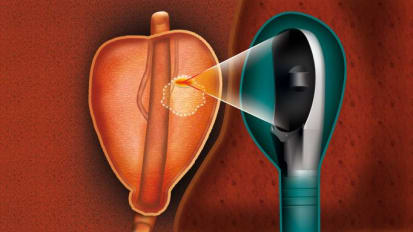 News
News
150 Milestone: Robotic Procedure Changes Prostate Cancer Care
UCSF Health has performed 150 robotic focal high-intensity focused ultrasound (HIFU) procedures for patients living with prostate cancer, becoming the first on the West Coast and the first UC Health System to reach that milestone.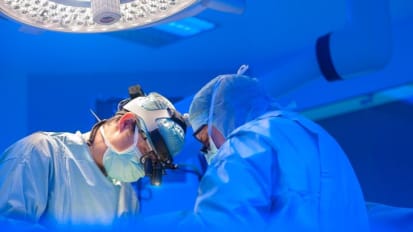 News
News
Adult Acquired Buried Penis: Improving Patient Outcomes
Adult-acquired buried penis (AABP) is a condition in which excess or abnormal surrounding soft tissue covers the penis, resulting in sexual and urinary dysfunction. While it’s associated with obesity, AABP does not typically subside with weight loss. News
News
What Matters Most to Patients Dealing With Stress Urinary Incontinence?
Many patients experience stress urinary incontinence (SUI) following surgical treatment for prostate cancer. To understand the impact of SUI on quality of life, a team of UCSF researchers interviewed and surveyed patients and published a series of studies. News
News
UCSF Health’s Eric Small, MD, Elected ASCO President for 2025-2026 Term
The American Society of Clinical Oncology (ASCO) has elected Eric J. Small, MD, FASCO, to serve as its president for the term beginning in June 2025. Video
Video
Erectile Dysfunction: Guide to Diagnosis and Complete Care for a Common Condition
This presentation from urologist John Lindsey, MD, lays out the numerous contributing factors as well as treatments for erectile dysfunction, which affects about 30 million men in U.S. but isn’t always discussed during regular checkups News
News
UCSF Health Performs 150th Robotic Focal HIFU Procedure
UCSF is West Coast leader for the innovative, minimally invasive treatment for prostate cancer patients. News
News
Novel Intraoperative Prostate Cancer Imaging Method Reveals Previously Undetectable Disease
UCSF researchers led the first-in-human study of a novel near-infrared fluorescence imaging agent that targets prostate-specific membrane antigen (PSMA). News
News
Transgender Women Benefit from Prostate Cancer Screenings
Transgender women keep their prostates after gender-affirming surgery, and as a result are still at risk for prostate cancer. News
News
Renowned Urologic Specialist to Lead UCSF Urology Program
Benjamin N. Breyer, MD, MAS, FACS, a renowned leader in urology and urological surgery, has been appointed chair of the UCSF Department of Urology.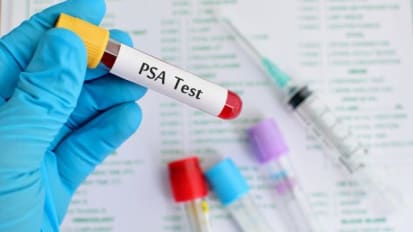 News
News
Personalizing Prostate Cancer Screening May Improve the Accuracy of Detection
The accuracy of prostate-specific antigen (PSA) screening for prostate cancer can be improved by accounting for genetic factors that cause changes in PSA levels that are not associated with cancer. Video
Video
Halt the UTI Cycle: Tips and Techniques for Treating a Common Urinary Woe
Urogynecologist Abigail Shatkin-Margolis, MD, offers an update to help PCPs efficiently assess and treat patients prone to urinary tract infections, with a focus on both young and elderly adults.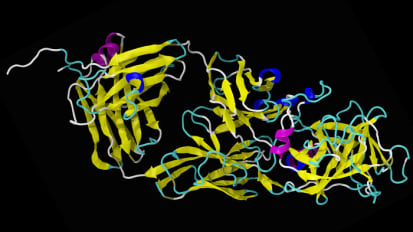 News
News
Patients With Detectable PSA After Radical Prostatectomy Have Good Long-Term Outcomes, UCSF Researchers Find
Patients with a detectable prostate-specific antigen (PSA) after radical prostatectomy (RP) may have excellent long-term outcomes, according to two retrospective studies conducted by UCSF researchers.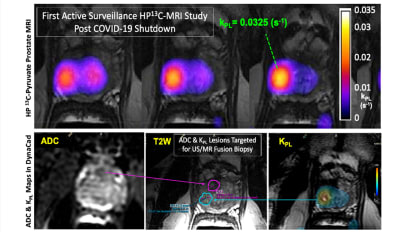 News
News
Novel Metabolic Imaging Method Detects Prostate Cancer Aggressiveness
UCSF investigators have shown that adding an emerging metabolic imaging technique to MR–transrectal ultrasound fusion prostate biopsies makes it possible to detect the extent and aggressiveness of prostate cancer more accurately than ever. News
News
New Guidance for Reducing Medication-Related Dementia Risk in Patients With Overactive Bladder
This consensus paper is designed to update urologists and other healthcare providers who prescribe anticholinergics about the risks of these medications and help guide them on when to use anticholinergics and when it is appropriate to use alternatives. Video
Video
Urinary Misery: How to Help Female Patients With Persistent Dysuria
In this resource-packed talk, urogynecologist Caitlyn E. Painter, DO, explains how to categorize causes, what to understand about urine cultures and other tests, and the latest evidence on which treatments help patients.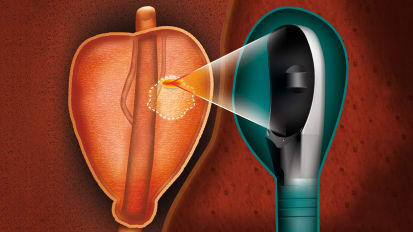 News
News
Focal High-Intensity Focused Ultrasound Ablation for Intermediate-Risk Prostate Cancer
The urologic surgical oncology team has performed an average of five focal HIFU procedures a month since the device was installed last year, offering patients a new minimally invasive treatment option. Video
Video
Pelvic Organ Prolapse: Better Terms and Effective Strategies for Primary Care Management
Urogynecologist Caitlyn E. Painter, DO, explains why the anxiety-provoking condition requires sensitivity from providers and how they can help patients understand the problem and find a solution – from Kegels to surgery – that suits them.

